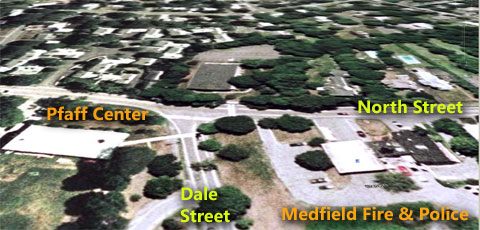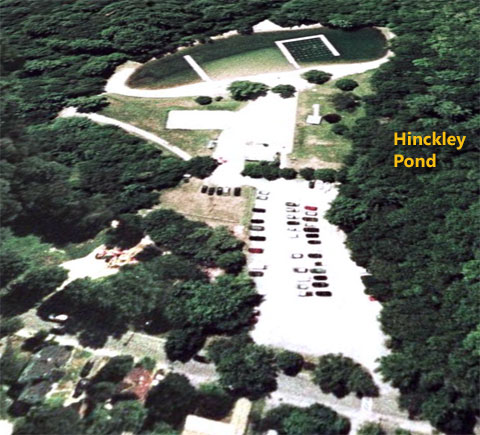Thu 23 Oct 2008
New Medfield Parks and Recreation Center
Posted by Christian Donner under Bicycling , Community , Traffic and Safety1 Comment
For some time now Medfield Parks and Recreation has been pushing plans for a new center in various locations of the town. If you read the Medfield Hometown Weekly this week, you probably saw a good summary of the history of the project, as well as of the arguments for and against it.
I am a Green Street resident with two small children and I feel somewhat impacted by the plans to build a new center at Hinckley Pond, but I don’t want to weigh in on the discussion with my personal concerns about increased traffic and noise and other “unspecific” fears.
I am much more concerned about (and eerily reminded of the Woodcliff Hills cut-through discussions by) the lack of comprehensive arguments on both sides.
If you have ever been inside the Pfaff Center, you will not disagree that the building needs to be torn down and replaced. But many other arguments that Parks and Recreation makes in this document (the minutes of the commission’s 10/15 meeting) do not hold up to basic questions.
This document claims that Parks and Recreation has to move out because the Fire and Police departments are waiting to tear down the Pfaff Center building. I am curious to know who made the case for the need of additional parking space, and by what argument? There is plenty of parking space around the police station. Whenever I drive by there, there appear to be open spaces. The Dale Street parking lot next to the police station is an eyesore, and I don’t buy into the need to create yet another eyesore at such a prominent location in this town.

The Pfaff Center on Medfield’s North Street/Dale Street intersection
What are the space needs of the Parks and Recreation commission, and how have they been substantiated? The 4000 sqft that they currently occupy in the Pfaff Center may not be enough, but why is there a need to expand the space to what is more than 3 times the current size? What is the reasoning for including space for basketball courts? Who would play there?
What will happen to the playground at Hinckley Pond? Who can possibly support a project that includes dismantling this nice playground that attracts visitors from neighboring towns and beyond, and replacing it with a dull and featureless metal structure?
In several places I read the argument that a prefabricated metal structure will be chosen over something nicer, for what appears to be cost-saving reasons. Where is the calculation that includes the long-term cost of ownership of a rapidly-decaying (and soon very ugly-looking) metal structure? The long-term calculation will look different once the life expectancy and cost of maintenance of the cheap structure is taken into consideration. Not to mention the negative impact on the character of our town.
The traffic argument … I don’t know where to start. In my opinion, Hinckley Pond and the playground generate plenty of traffic as it is, particularly in the summer. The argument that traffic will increase substantially is weak and I don’t buy it. The much more pressing issue is that traffic on Green Street, particularly the lower end between North Street and Hinckley Pond, is already desperately in need of fixing today, without the new building. The sidewalks are not separated from the road and very dangerous to use. Speeding is the rule, not the exception, and there is practically no traffic enforcement on Green Street. There is no bike lane.
There is no question that a central location of the new center makes a lot of sense. This is the year 2008. When planning a (quasi-)public infrastructure site, the energy balance must be taken into consideration, and the energy used by people driving to and from the site is part of the equation. Therefore I would argue that any plans for a site on Green Street must include plans (and funding) for fixing the road and slowing down traffic: new curbs and sidewalks on lower Green Street, stop signs at Brook Street, the Hinckley Pond crosswalk, Summer Street, Kenney Road, and Cyprus Street, and a bike lane that is safe to use on the entire length of Green Street.
If the commission makes the argument that children could ride their bikes or walk to the Hinckley Pond location, then they must also provide the conditions that will enable safe foot and bike traffic on Green Street.
My recommendations:
– Re-negotiate the right to use the Pfaff Center land with the town
– Provide a comprehensive long-term cost-of-ownership calculation that includes maintenance of the site and building, and an energy-balance for both the site itself and traffic
– Based on the results of such a study, tear down the existing Pfaff Center and replace it with a structure that is durable, functional, and in balance with the character of the town

Hinckley Park with the pond, playground, and parking lot
One last thought regarding the proposed skate park and its financing: it appears that the 9/17/08 minutes were amended in these 10/01/08 minutes with the intent to make the language about funding requirements by the town more vague and unspecific. This is interesting, and I would love to know why this was done. What was clearly lost by this change is the requirement to provide for the cost of ongoing maintenance of such a site. It cannot be that the town allows a small group of citizens to lobby for and ultimately build a skate park that subsequently either becomes a financial burden for tax payers – or a delapidated eyesore much like the deserted basketball court on Dale Street. Please, dear Parks and Recreation commission, make sure that the group who is pushing to build this skate park will be required to provide funding for ongoing maintenance, upkeep, and repairs.
As it is the case with any such project, the long-term cost of ownership will outweigh the initial cost of construction. Only if the cost of ownership is guaranteed to be paid for by the proponents of the project through a legally binding contract, the skate park project should be allowed to proceed.
December 22nd, 2008 at 7:30 pm
There is no doubt that the current Pfaff Center is an old, antiquated building that no additional monies should be put towards renovations. It is an eightly year old school building that by default became the home of Parks and Recreations. However the land that the Pfaff Center sits on is much more valuable to the town. Presently Dale Street teachers and employees park on the gravel lot that is part of Fire and Police. One reason why the lot has never been paved is that if (and it’s really a “when”) Fire and Police proceed with their new building, the employee cars from Dale Street School will be displaced in that the gravel lot will become part of the Fire and Police Complex. And as it exists right now you have a dangerous situation with parents picking up children having to cross a busy Dale Street. So my suggestion is to knock down the Pfaff Center and build a parking lot to complement the Dale Street School. You would have a safer situation with people not having to cross the street and you would also alleviate the congestion on Adams Street. Now where do you put Park and Recreation? McCarthy Park is too far away from the center of town and Green Street can not handle any additional traffic. Plus it seems to me that a majority of the residents near Hinkley Park do not want it built there. The best answer I have heard came from our own Police Chief Meaney which is to have Park and Recreation partner with the Fire and Police Project. You have an entire town block from North to Dale to Adams Street. You can build into the ground and go up several stories. In the event of emergencies the gym can double as a shelter. I also guarantee to you that there would be zero vandalism with a recreation center inside a police building. And as it stands right now the town parks are suspect to vandalism and graffiti on a regular basis. Look what happened to the brand new high school track. This is a creative and novel idea and I wish the Park and Recreation Commissioners would reach out and discuss this possibility with Police and Fire.